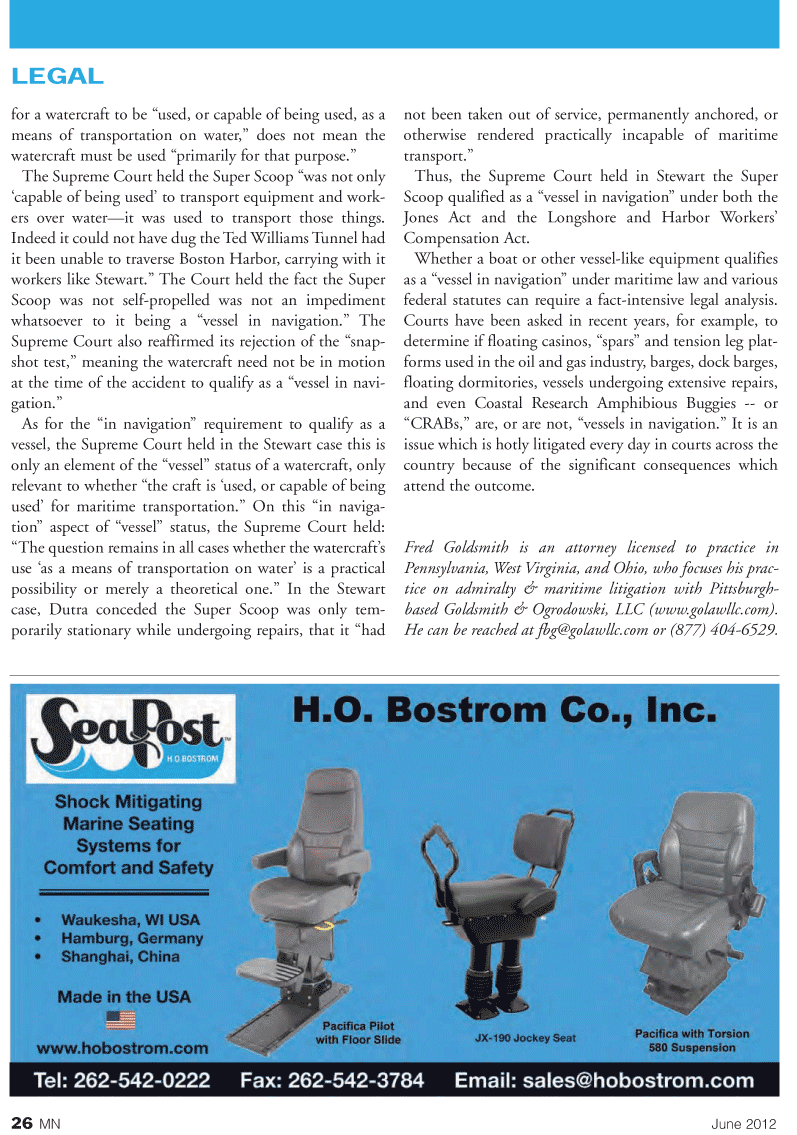
Page 26: of Marine News Magazine (June 2012)
Dredging & Marine Construction
Read this page in Pdf, Flash or Html5 edition of June 2012 Marine News Magazine
for a watercraft to be used, or capable of being used, as a means of transportation on water,? does not mean the watercraft must be used primarily for that purpose.? The Supreme Court held the Super Scoop was not only capable of being used to transport equipment and work- ers over water?it was used to transport those things. Indeed it could not have dug the Ted Williams Tunnel had it been unable to traverse Boston Harbor, carrying with it workers like Stewart.? The Court held the fact the Super Scoop was not self-propelled was not an impediment whatsoever to it being a vessel in navigation.? The Supreme Court also reaffirmed its rejection of the snap- shot test,? meaning the watercraft need not be in motion at the time of the accident to qualify as a vessel in navi- gation.?As for the in navigation? requirement to qualify as a vessel, the Supreme Court held in the Stewart case this is only an element of the vessel? status of a watercraft, only relevant to whether the craft is used, or capable of being used for maritime transportation.? On this in naviga- tion? aspect of vessel? status, the Supreme Court held: The question remains in all cases whether the watercrafts use as a means of transportation on water is a practical possibility or merely a theoretical one.? In the Stewart case, Dutra conceded the Super Scoop was only tem- porarily stationary while undergoing repairs, that it had not been taken out of service, permanently anchored, or otherwise rendered practically incapable of maritime transport.? Thus, the Supreme Court held in Stewart the Super Scoop qualified as a vessel in navigation? under both the Jones Act and the Longshore and Harbor Workers Compensation Act. Whether a boat or other vessel-like equipment qualifies as a vessel in navigation? under maritime law and various federal statutes can require a fact-intensive legal analysis. Courts have been asked in recent years, for example, to determine if floating casinos, spars? and tension leg plat- forms used in the oil and gas industry, barges, dock barges, floating dormitories, vessels undergoing extensive repairs, and even Coastal Research Amphibious Buggies -- or CRABs,? are, or are not, vessels in navigation.? It is an issue which is hotly litigated every day in courts across the country because of the significant consequences which attend the outcome. Fred Goldsmith is an attorney licensed to practice in Pennsylvania, West Virginia, and Ohio, who focuses his prac- tice on admiralty & maritime litigation with Pittsburgh- based Goldsmith & Ogrodowski, LLC (www.golawllc.com). He can be reached at [email protected] or (877) 404-6529. LEGAL26MNJune 2012

 25
25

 27
27
